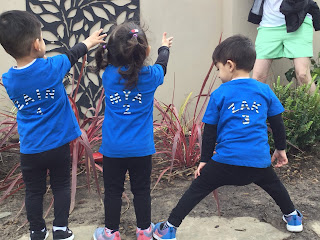Like adults, children have up and downs, and times when they feel overwhelmed or out of control. Due to their age, having less experiences and time to develop skills in managing feelings, children need adult’s help in managing their emotions as they grow and develop.
When adults respond to children’s cues and help them manage
their feelings of uncertainty, helplessness, or being overwhelmed, children
feel safe and trust that there is someone there to help them when they need it.
With experiences of warm, responsive and trusting adults, children can
gradually learn to manage their emotions for themselves.
What
are the benefits of supporting children in managing their emotions?
·
children who feel calm
and safe are more able to maintain focus and attention, which is central to
their overall development
·
helping children
manage their emotions increases their feelings of confidence and self-worth,
and minimises stress
·
when children have
repeated experiences of having their needs met by a responsive and caring
adult, it can help them develop a positive sense of self, manage their emotions
and to get along with others
·
when children have
these experiences, they are more likely to be mentally healthy and have good
relationships with others
·
supporting children to
manage their emotions contributes to their feelings of satisfaction, happiness
and overall success in life
When parents and carers provide warm, trusting and responsive
care towards children, it enables them to respond with appropriate emotions and
behaviour, internalise a positive view of themselves and develop an
understanding concern for others.
Children become more independent in managing their emotions
across more situations over time; however, it is important to acknowledge that
turning to others for guidance and support, especially in times of stress,
remains an important coping skill throughout life. Children might need extra
support in times of change and transition, when they have fears and worries,
when they are feeling upset, sad or angry, or after experiences of trauma.
Maintaining
feelings of safety, calm and optimism
Helping children manage their emotions involves creating and
maintaining feelings of safety, calm and optimism. This can often mean helping
a child to move from a negative state where they may feel stressed, anxious,
angry or frightened into a positive state where they feel safe and calm and
ready to move on. This involves lowering the child’s ‘stress’ hormones (such as
cortisol and adrenaline), and increasing their ‘feel good’ hormones (such as
dopamine, serotonin, and oxytocin). This helps keep them balanced, maintain
regularity, manage memory and attention, increase feelings of trust, develop
social skills and empathy for others, reduce fear and feel pleasure.
Parents and carers can help children manage their emotions by
being calm, warm and providing children with safety and security. Parents and
carers can convey warmth, caring, and security by:
·
demonstrating interest
in the child through eye contact, and actively
listening to children and responding in a timely manner
·
using open-ended
questions, where appropriate, which enables the child to express their feelings
(e.g. “What are you worried about when you go to school?”)
·
reflecting in your own
words what you understand the child has said and their experience (e.g. “You
seem to be feeling a bit upset about not making the netball team”)
·
being at the same
physical level so the child feels more comfortable, and being close to the
child, with no things or other people between you
·
having an open,
relaxed body posture, and a positive facial expression
·
speaking in a soft to
normal volume, using a normal to low pitch and a slow, even tempo.
Positive
touch helps children manage their emotions
Another helpful way to convey warmth, caring and security and
help children manage their emotions is through positive touch. This includes
physical gestures such as hugging, cuddling or gently patting children in a
respectful and appropriate way. Positive touch is beneficial across the
lifespan and helps show positive emotions to the child, for example, "I
understand that you are feeling sad right now". It is beneficial for
children’s development of a separate sense of self, capacity to receive and
give nurturing touch experiences, is an important factor in developing close
relationships with others and can even reduce stress and release feel good
emotions.
Most babies and toddlers, and some older children, benefit from
cuddles and hugs, but older children may prefer gentle touches to their arms,
shoulder, head or back or a simple ‘high five’. Some children might not enjoy
being touched, and children will have their own preferences, so it is important
in this case for parents and carers to find other ways to connect.
Emma
McKenzie
Teacher - Edgerley Room
Wellbeing Facilitator


















































